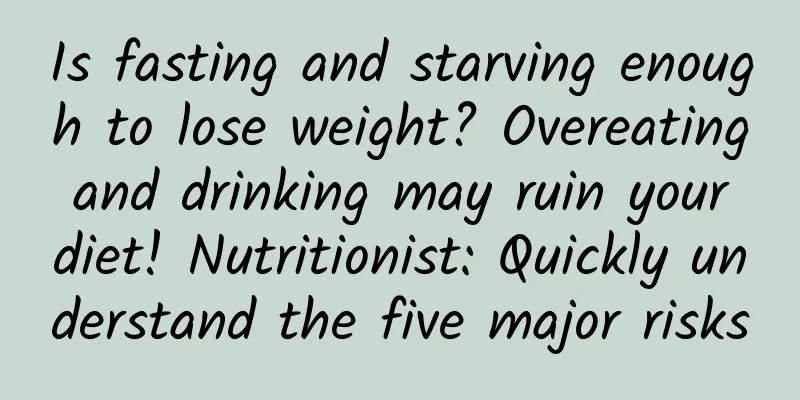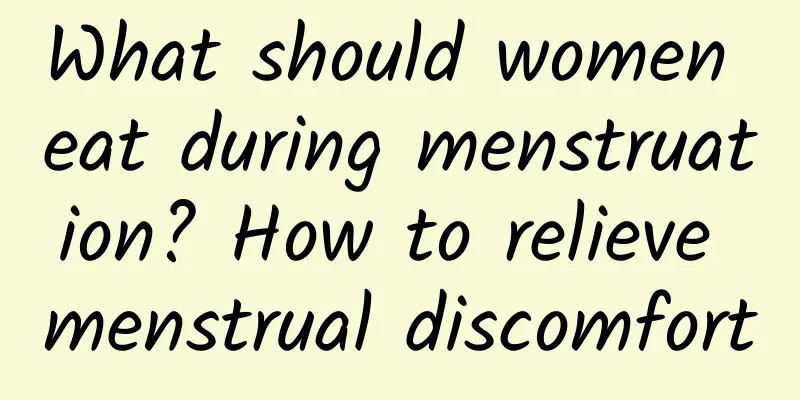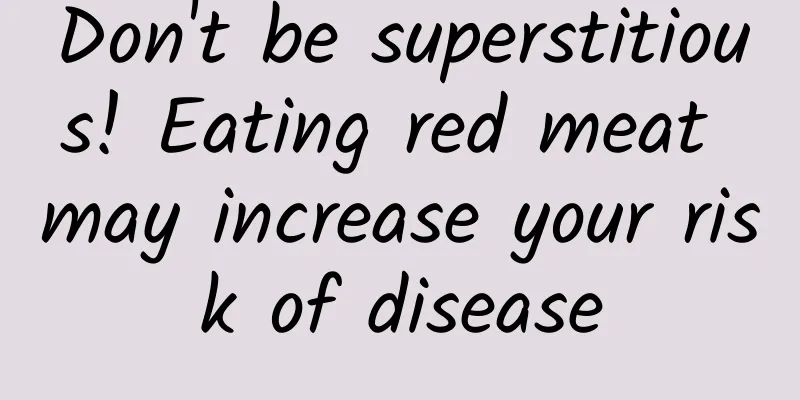Is fasting and starving enough to lose weight? Overeating and drinking may ruin your diet! Nutritionist: Quickly understand the five major risks

|
There are numerous weight loss methods, and the "fasting method" that has swept the world has become even more popular in China. In order to lose weight quickly in a short period of time, many people think that they can achieve the goal of losing weight by just dieting and starving themselves. However, the fasting method, which seems to be a simple concept, will be less effective if it is not implemented correctly. Nutritionists remind that before starting to practice fasting, it is best to first understand the five major risks of fasting, which can help you lose weight. The currently popular fasting methods have one thing in common, which is that they all involve fasting for at least 16 hours, or extending the fasting time to one meal a day (24 hours), one meal every two days (48 hours), or even more radically relying only on drinking boiled water for 3 to 5 days, and then eating a 1,500-calorie (or even higher) meal to make up for the calories needed for the day. Nutritionist Cai Yixuan said that through a long-term fasting process, the body's insulin level can be reduced to a minimum. Insulin is a major driver of the body's energy storage. Therefore, once the body's insulin is reduced, you can happily make use of the long-stored energy in the body, that is, body fat, to achieve the goal of losing weight. After implementing intermittent fasting, don’t eat too much when you start eating, otherwise your weight loss efforts will be ruined! No matter which fasting method you choose, you must eat properly during the "eating period". It is recommended to have two meals a day and not eat in between. To establish the correct concept of fasting, nutritionist Cai Yixuan reminds you that before starting fasting, you must pay attention to the following 5 major risks in order to lose weight effectively and healthily. [Five major risks of fasting that you must know] 1. If you can’t bear the hunger, you will fail Let's start with the most practical perspective. The reason why people get fat is because they cannot control their mouths. They love delicious food but have difficulty controlling the portion. Many people finish their lunch at 1 p.m. and it is difficult for them not to eat before getting off work at 6 p.m. They also have to endure 16 hours of hunger. Even extending the fasting time to 48 hours is simply more difficult than climbing a mountain to heaven. Fasting will not help you lose weight for a long time. Even if you survive hunger once or twice, if you can’t stick to it, it will be difficult to maintain your weight in the long run. It is recommended to start with a fasting method that is easy for you to implement, such as the 168 fasting method. 2. Impaired intestinal function If the first victim of fasting is the physical and psychological emptiness caused by hunger, then the second victim is the intestines. The intestine is an organ that cannot bear to be lonely. It needs to constantly receive the physical stimulation brought by the passing of food, and at the same time directly absorb and utilize the necessary nutrients from the food to maintain the health and vitality of the intestine. However, when fasting, the intestinal mucosa will begin to atrophy due to the lack of these stimulations and nutrients, further leading to functional impairment. If you are an active faster and want to try a more radical long-term fast, you must be especially careful. At this time, the body will begin to burn amino acids and stored fat, which may cause the body's pH to become acidic. You must drink enough water to avoid electrolyte imbalance, which may cause cramps, muscle pain, emotional instability, etc. 3. Gallstone Risk The small gallbladder under the liver is a major contributor to the emulsification of dietary fats, but if you fast for a long time, have irregular meals, or consume too little fat, it will deprive the gallbladder of its opportunity to work. The bile in it cannot be discharged normally, which can easily cause gallbladder inflammation and gallstones. When you need to replenish the day's calories after fasting and consume high-calorie, high-fat meals, it will stimulate the gallbladder to contract rapidly, causing the bile sand or stones in the gallbladder to squeeze into the gallbladder duct, causing nausea and unbearable pain. You may not want to try it. 4. Constipation Besides being afraid of being hungry when losing weight, the second most annoying thing is constipation. Fasting reduces food intake, and the amount of stool naturally decreases. Although occasionally not having a bowel movement for one or two days may not have much impact, if you develop irregular bowel habits for a long time, it will aggravate the constipation! 5. Electrolyte imbalance + arrhythmia If you are an active faster and want to try a more radical long-term fast, you should be especially careful. At this time, the body will begin to burn amino acids and stored fat to produce ketone bodies to provide energy for the brain and body. However, the production of ketone bodies may make the body's pH value tend to be acidic. If you do not drink enough water, it can easily lead to electrolyte imbalance, causing cramps, muscle pain, emotional instability, and even ketoacidosis or arrhythmia, which are life-threatening. If you safely survive a long fast, don't take it lightly and binge eat and drink right away, because long-term fasting will put your body's cells into standby mode. If you suddenly eat a lot of food, it will easily cause electrolyte and body fluid abnormalities, leading to complications such as heart, nervous system, and respiratory system dysfunction, and in severe cases, it can even lead to death. In addition to weight problems, many obese people also have metabolic diseases such as metabolic syndrome and diabetes. If they rashly fast at this time, they may also face risks such as hypoglycemia, ketoacidosis, dehydration, and coma. Nutritionist Cai Yixuan reminds that before using any special weight loss method, you must consult a doctor and nutritionist for evaluation before proceeding. Don't just follow the trend, or you may end up losing weight and your health. |
Recommend
What is cervical atrophy? Medical explanation of cervical atrophy
The appearance of cervical atrophy symptoms has a...
Treatment of abnormal leucorrhea in gynecology
An abnormal increase in gynecological vaginal dis...
What to drink to get better faster for dysmenorrhea and cold uterus
Drinking warm brown sugar ginger tea can effectiv...
What to do if you have uterine fibroids? Treatment of uterine fibroids
Diseases need to be treated in time, and avoiding...
3 soups to relieve menstrual cramps
Dysmenorrhea is a headache that almost every woma...
Experts introduce to you the causes of clinical uterine fibroids!
Uterine fibroids can occur in any part of the ute...
How much does it cost to induce labor in Beijing? Ways and methods of inducing labor
Sometimes couples fail to take protective measure...
What to do if you have irregular menstruation after having an IUD inserted? 5 symptoms of irregular menstruation after having an IUD inserted
Neuroendocrine dysfunction, organic diseases or m...
So fattening ~ 3 pieces of tofu skin have more calories than 1 bowl of rice! It’s better to eat less of these hot pot ingredients
As the weather turns colder, more people are eati...
Honeysuckle drink prescription suitable for patients with pelvic inflammatory disease
Traditional Chinese medicine believes that pelvic...
What is the best treatment for congenital absence of vagina?
During the differentiation and formation of sexua...
Suffering from periodontal disease, bad breath, or eczema? Obesity is the culprit
Do you believe it? Obesity not only affects appea...
The King of Herbs, American Ginseng, Can Effectively Relieve Cancer Fatigue
In traditional Chinese medicine, ginseng is known...
Will cervical adhesions occur in spontaneous complete abortion?
Cervical adhesions may occur after a complete spo...
Can you get pregnant with uterine fibroids? Is there any danger in getting pregnant with uterine fibroids?
Can patients with uterine fibroids get pregnant? ...









